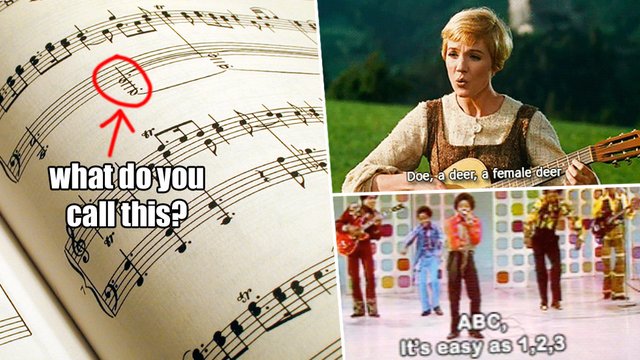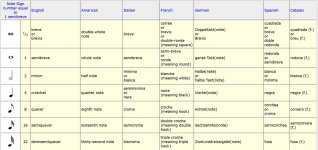You are using an out of date browser. It may not display this or other websites correctly.
You should upgrade or use an alternative browser.
You should upgrade or use an alternative browser.
Culture difference ?
- Thread starter EMan
- Start date
Ventura
Been here for ages!
>>> continues my blissful ignorance on the subject
Dingo40
Been here for ages!
Some more on the musical muddle  :
:

 www.classicfm.com
www.classicfm.com

How music theory works in different countries
Thought music was a universal language? Think again. Here’s a bit about how music theory works around the world.
Javthedog
Active member
Yes, but no, but....... if it looks like a duck, quacks like a duck, smells like a duck, swims like a duck, it probably is a duck - in english - pato, canard, ente, anatra ...in portuguese, french, german, italian....... doesn't really matter what you call it it's still the same thing.Some more on the musical muddle:

How music theory works in different countries
Thought music was a universal language? Think again. Here’s a bit about how music theory works around the world.www.classicfm.com
I'd also take a little issue with the article where it say do, re, mi is C, D, E..... it can be the 1st 3 notes of any scale!
"do, re, mi is C, D, E..... it can be the 1st 3 notes of any scale"
Yes, in England where it's Tonic sol-fa
but
In France: doh is a key - and re and fa ... and so on and La = 440Hz
Yes, in England where it's Tonic sol-fa
but
In France: doh is a key - and re and fa ... and so on and La = 440Hz
Javthedog
Active member
Learn something every day ! Thanks. Thinking….. so how are the notes in the scale of fa described?
fa, sol, la, si,bémol, doh, ré, mi, fa
Sol majeur (G) :
sol, la, si, doh, ré, mi, fa dièze, sol
Sol majeur (G) :
sol, la, si, doh, ré, mi, fa dièze, sol
Javthedog
Active member
Good one - thanks. Just remembered I read something a while ago that said in Turkish music the space between 2tones can be divided into 2b/2#, not the western 1b/#…
JeffJetton
Prolific poster
Another difference is chord symbols. I've gotten used to Italian lead sheets.... Sol7, Dom, etc ....but I often forget to mention it when I hand a chart to a guitarist.
And then there's the whole AAA bass notation vs. spelling out all the notes in the chord bass notation.
All part of the fun of playing an instrument as "international" as the accordion!
To say nothing about a drummer playing a trap set. Four limbs = four independent rhythms.Don’t laugh too hard. Hand independence is something kids learning many musical instruments must develop. It’s easier for some than others.
4 independent rhythms? Now that boggles my mind! I've seen and tried 2, but 4? Or even 3? Wow!To say nothing about a drummer playing a trap set. Four limbs = four independent rhythms.
Alan Sharkis
Prolific poster
An American comedian, Sid Caesar, used to play a character known as "Cool Caez" on his television show. Cool Caez had very thick eyeglasses, dressed like a Beatnick, and played tenor sax. In an interview, he claimed to be able to hit H above high C. When asked, "Doesn't the scale stop ay G?," he replied, "Not for the brave."Wait'll you hear what the Germans call B-
Javthedog
Active member
Cue the drummer jokes!
JeffJetton
Prolific poster
4 independent rhythms? Now that boggles my mind! I've seen and tried 2, but 4? Or even 3? Wow!
I've gigged with a few drummers who played four different rhythms at the same time.
Not on purpose, mind you...
In keeping with of our "cultural differences" theme, H = B (and B = Bb) in Germany. So maybe it was a kind of multifaceted joke, with a wink to the Klezmer players in the band. In any case, he was right. You have to be brave to play those high notes.An American comedian, Sid Caesar, used to play a character known as "Cool Caez" on his television show. Cool Caez had very thick eyeglasses, dressed like a Beatnick, and played tenor sax. In an interview, he claimed to be able to hit H above high C. When asked, "Doesn't the scale stop ay G?," he replied, "Not for the brave."
Alan Sharkis
Prolific poster
I have some experience with that. A few years back, I found a used trumpet and started to take trumpet lessons. I also have a small hiatal hernia. Everything was fine until I started to get into higher notes and experienced diaphragm pain. My trumpet teacher advised me to take a month off and then decide if I wanted to continue.In keeping with of our "cultural differences" theme, H = B (and B = Bb) in Germany. So maybe it was a kind of multifaceted joke, with a wink to the Klezmer players in the band. In any case, he was right. You have to be brave to play those high notes.
At the end of the month I said to myself, “Self, what are you, nuts?”
I never played trumpet again.
rosette
Member
It may be a slight exaggeration to call it a 'culture difference'.
I learnt the British naming convention when I was younger learning piano but rarely used sheet music in my teenage years with the guitar as it was far easier to use tabs.
I can still read sheet music albeit not very well, it's easier for me to figure it out by ear.
If I do have to read sheet music I don't think of it in terms of any notation names anyway, you just sort of develop a feel for it, especially if you know the melody beforehand.
I learnt the British naming convention when I was younger learning piano but rarely used sheet music in my teenage years with the guitar as it was far easier to use tabs.
I can still read sheet music albeit not very well, it's easier for me to figure it out by ear.
If I do have to read sheet music I don't think of it in terms of any notation names anyway, you just sort of develop a feel for it, especially if you know the melody beforehand.
rosette
Member
Yeah...but the British haven't been too big on the metric system generally speaking.Interesting take to consider that US-style rhythm naming is sort of the "metric system" of notation, isn't it? Precise, mathematical, unambiguous.
Heck, I say we go whole-hog and make it completely SI-compatible:
Code:OLD NEW ----------------------------------- Whole Note 1 measure Half Note 5 decimeasures Quarter Note 25 centimeasures Eighth Note 125 millimeasures
Might have some rounding errors with triplets though...
Imperial measurements are still dominant especially in everyday talk.
In Australia we still use feet / pounds on occasion. Not that strange since metrication only happened in the 70's.
rosette
Member
Interesting table.
The Deutsch / German version is similar to the American version
Similar threads
- Replies
- 11
- Views
- 317
- Replies
- 14
- Views
- 761
G
- Replies
- 6
- Views
- 2,162
G

